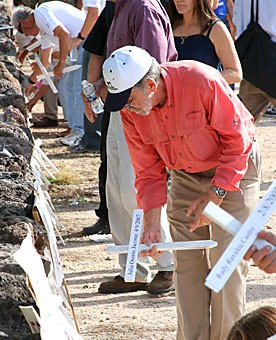Fallen border crossers were honored yesterday at the seventh annual March for Migrants, which drew more than 60 participants.
Humane Borders organized the event, which aimed to remember those who have perished in the Arizona desert and to draw public attention to the growing number of migrant deaths, said Ani Goodenberger, program coordinator for Humane Borders.
Participants gathered at 2 p.m. at First Christian Church, 740 E. Speedway Blvd., where Robin Hoover, founder of Humane Borders, gave a speech.
This year alone, 246 migrants have died after crossing the border into Arizona, Hoover said. That number is expected to reach 275 before the year is out, he added.
“”It’s unfortunately becoming commonplace and even increasingly accepted by the public, by the media and by officials,”” Hoover said.
Mark Townly, president of Humane Borders, asked those in attendance how many had participated in efforts to provide water stations for border crossers in remote desert locations. Nearly everyone had.
“”The horrific number (of deaths) would be much higher if it wasn’t for what people in this room do,”” Townly said.
After the service, which included prayer and speeches by several Humane Borders volunteers, Sarah Bollinger, a Humane Borders intern, read the names of the fallen migrants who perished this year. Of the 246 individuals who have been recovered, 110 have still not been identified.
As the names were read, members of the audience stepped forward and picked up white wooden crosses bearing the names of the fallen. Some of the crosses read desconocido, Spanish for “”unknown.””
With crosses in hand, and carrying signs reading “”We demand just and humane borders”” and “”U.S. immigration policy kills,”” the marchers walked west on Speedway Boulevard to De Anza Park at the corner of Speedway and Stone Avenue.
“”The fact that people are dying close to my home to try and come and make a better life for their families is really tragic,”” said Kristin Roth, a three-year Humane Borders volunteer.
The marchers quietly placed the crosses and signs against the stone wall on the west edge of the park, where motorists and pedestrians could see them. The march ended with a prayer led by Rev. Randy Mayer of First Christian Church.
A young woman attended whose sister has been missing for a month since crossing the border into the Tohono O’odham reservation. She was nine months pregnant when she disappeared.
“”Very, very little is being done to reduce deaths or at least human suffering,”” Hoover said.
Humane Borders director Sue Goodman said her organization has two goals.
“”One is to lower the number of deaths among the migrants in the desert. Most of them die from dehydration, so we put water out,”” she said. “”And secondly, we want to work to change the immigration laws and enforcement policies that are causing people to die to start with.””
“”We would like to see people who are working here have some sort of legal status. That would be the first thing,”” Goodman said. “”Then we’d like to see an increase in the number of visas that equally matches the number of jobs available.””
She added that there should be an incentive for compliance with visas.
“”I think, as a human being and a Christian, no one deserves to die in the Arizona Sonoran Desert for lack of a cup of water,”” said Mike Wilson, a Humane Borders volunteer who acts independently of the organization to set up water stations on the Tohono O’odham reservation.
Despite its nonprofit status, Humane Borders is recognized by the IRS as a 501(c)(4) organization, which can lobby state and federal legislators.
“”The immigration policy of the United States if fatally flawed,”” Hoover said. “”Now is the time to take death out of the immigration equation.””









